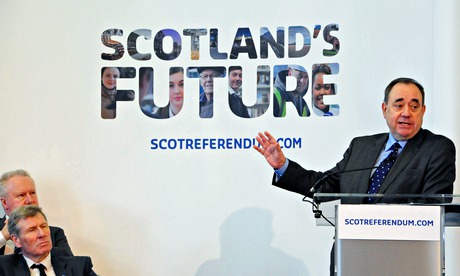Salmond and Darling will batter viewers with data in Tuesday’s TV debate, but in the end the heart will outweigh the wallet

In Scotland, if you doubted the stakes, wait for Tuesday’s televised independence debate between Alistair Darling and Alex Salmond. The race remains close, and is likely to get closer. This weekend’s Survation poll put “no” ahead by just 6%. That is uncannily close to the polls six weeks before the Quebec referendum in 1995, which the Canadian federalists won by a nail-biting 1.2%.
The downside of these two TV champions for their cause is that they are both so economic: the former UK chancellor of the exchequer against the former Royal Bank of Scotland oil economist (and a good one). The danger, as a non-economist Treasury minister once said after a mandarin’s briefing, is that the viewers will be just as confused at the end – but at a higher level.
I have been reading the Scotsman – an excellent paper – and the Glasgow Herald day after day, which has given me a sympathy for Scottish voters who must be punch-drunk from rival, largely economic claims about the future. The two campaigns recently excelled themselves by producing on the same day apparently authoritative assessments that diametrically contradicted each other.
For the unionists, a UK Treasury-sponsored report suggested that each Scot would be £1,400 a year better off in the union. For the nationalists, another report from the Scottish government suggested that Scots would be £1,000 a year better off outside it. This is bemusing enough for anyone with a background in economics, let alone anyone without one. It is also largely irrelevant. Both sides are deploying spurious precision for economic issues that are largely unknowable in the current state of economics.
In one of my past lives, I used to assess the strength and risks of different economies for potential international investors. “Sovereign risk”, as it is called, is an art, not a science. Politics matters as much as economics, and big or small size has both advantages and disadvantages. Scotland’s population, at 5.5 million, is similar to the 5.6 million in Denmark – a perfectly respectably sized nation that has proved to be a rich success for years. The upside of being the size of Denmark, as opposed to the size of the UK or France, is that you can be nimble in reaction to global economic shocks and opportunities. The state can help businesses adjust and respond. All the key players can meet up and reach consensus in a reasonably sized room.
This helps. Of the 10 most prosperous nations on Earth, measured in the most effective manner by the World Bank’s national income per head allowing for purchasing power, only the US is big. The next biggest countries are Sweden (9.5 million people), Switzerland (8 million), Denmark and Norway (5 million). Germany comes in at 13th, France 18th and the UK 21st.
If we take culturally similar countries that share a language, small usually trumps big. Irish income per head is now 0.5% higher than the UK’s, even after profits have been paid to foreign investors. Austria is 0.3% ahead of Germany, and Belgium is 8.7% ahead of France. One exception is that Canada is slightly poorer than the big US.
The major disadvantage of small size is that you can be buffeted by global shocks if you specialise in particular industries. Finland was hit by the collapse of the Soviet Union, because it exported so much there. Iceland and Ireland were particularly badly hit by the banking crisis. Big countries are naturally more diversified, and therefore less vulnerable to shocks.
If the Scots vote for independence, there may be some transitional costs where there are economies of scale with the UK – embassies and so forth. I cannot see how the Bank of England could be lender of last resort to Scottish banks after independence, so there may be losses as financial services companies prefer a London regulator and backer. This was the experience with Quebec, where the fear of independence drove Montreal-based insurers to Toronto. But the big picture suggests that these will be small and short-term effects.
Natural resources such as oil and gas matter much less than both Salmond and Darling will pretend. The truth is that rich countries do well because of their human skills and ingenuity, not their resource windfalls. Look at Switzerland. On education, Scotland’s performance in the OECD international tests of student achievement is a little better than England for reading and maths, and a little worse for science.
If Scotland goes, it will be in everyone’s interest to have a “velvet divorce”, as the separation of the Czech Republic and Slovakia was described. A nasty and messy separation would damage both sides. London will want early certainty, and for Scotland to be an EU member alongside the rest of the UK. The result on 18 September may rewrite history, but not geography. We will all still share the same island. Their mess will be ours, both sides of the border. So we will all have an interest not to make a mess.
If Scotland stays, as I hope it will, the UK will never be the same again. More fiscal powers – including the power to borrow – will provide a new impetus to decentralisation, not just to Edinburgh but to Cardiff, Manchester, Leeds and Newcastle. We will need a new constitutional settlement, and new ways, as all federal states enjoy, of legally settling differences between levels of government. These are challenges already met and mastered in Canada, Australia and elsewhere.
The main motive, if Scots opt for independence, will be their desire to shake off the incubus of English conservatism. The natural centre of gravity of Scottish politics will be more leftwing than that of the UK. Scotland could be a successful, liberal-minded and social democratic nation on the Scandinavian model. Nothing wrong with that, except for English progressives who will have to contend with a centre of gravity that has moved to the right. For England and Wales, politics will adjust. The Labour party would become more rightwing to ensure a competitive system.
In the end, it seems to me offensive on the part of both sides in the debate to concentrate so slavishly on the economics, when realistically the economic outlook cannot and should not be decisive. It is as if they have both leased their campaigns, in the old adage, to people who know the price of everything and the value of nothing. It is the heart that will decide the future of our island, not the pocketbook. That is surely right.

No comments:
Post a Comment